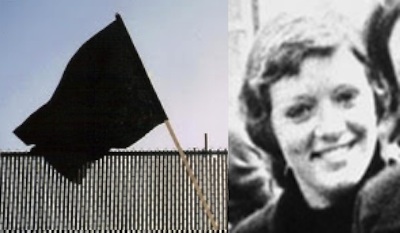
The passing of Dolours Price, a republican legend, has come as a deep shock to the entire community, regardless of politics or allegiance.
Dolours was a mother of two sons and former wife of leading actor Stephen Rea. She was found dead at her Malahide home on Wednesday night.
Her death has seen an outpouring of sympathy and respect on social networks, and hundreds of messages have been posted in tribute.
Dolours suffered profoundly from post-traumatic stress disorder relating to her time on hunger strike in 1973/1974, and had previously attempted to commit suicide.
In July last year, she said she was “completely distraught” with anxiety for the wellbeing of her sister, who is younger by three years. Marian Price was interned without trial by British decree almost two years ago, and is still under prison guard in hospital.
“We formed bonds in English prisons and in Irish prison that can never be broken,” she said. “I hope and trust she will find the strength and courage to keep on going.”
She had been a harsh critic of Sinn Féin in recent years and had repeatedly clashed with its leader, Gerry Adams, over his alleged role in the IRA and his party’s ‘sell out’ of republican principles.
The Belfast native had also come under pressure in recent months as a result of interviews she gave in confidentiality with researchers associated with a ‘conflict archive’ funded by Boston College.
The taped recordings were subpoenad by the PSNI police as part of their historical investigations into the IRA -- potentially implicating Mr Adams and others -- but have since become mired in legal wrangles on both sides of the Atlantic, including a potential US Supreme Court challenge.
Mr Adams said yesterday he was “profoundly saddened” by Price’s death and extended his sympathies to her family.
“I have known Dolours for a very long time. She endured great hardship during her time in prison in the 1970s, enduring a hunger strike which included force feeding for over 200 days,” he said.
“In more recent years she has had many personal trials. I am sure all of those who knew Dolours will be very sad at the news of her death.”
Sinn Féin’s Gerry Kelly, who fought alongside her in the IRA, said he was shocked by the news. “A life cut short. She will be sadly missed by her family and friends.”
The 32 County Sovereignty Committee offered their condolences to the Price family. “An unbowed and unapologetic Republican, she will be remembered fondly by all within the Sovereignty Movement.”
In a statement, the two Boston College journalists, Ed Moloney and Anthony McIntyre, also expressed their sadness at her death.
“Throughout the last two years of our fight to prevent her interviews being handed over to the police in Belfast, our greatest fear was always for the health and well-being of Dolours,” they said. “Now that she is no longer with us perhaps those who initiated this legal case can take some time to reflect upon the consequences of their action.”
A TROUBLED LIFE

Dolours was one of the IRA’s most prominent members during the early years of the recent conflict.
Her father Albert Price was a veteran IRA man, a survivor of the 1940s campaign. She recalled how her father would recount his years in the struggle, and said of her family that Republicanism was “part of our DNA”.
Grammar-school-educated, she was in her final year of teacher training at St Mary’s College on Falls Road in west Belfast when she was arrested for her part in an IRA’s campaign on British soil.
She joined the IRA following internment in 1971. Before that she had been a member of the left-wing People’s Democracy.
Attractive, well-spoken and university-educated, she was part of a new breed of articulate IRA members. She was the first female IRA member. Until that point women were recruited into the Cumann na mBan.
At just 22 years of age Dolours had already risen rapidly through the ranks of the IRA and was privy to the most secret of information as part of an elite unit.
She was the leader of a nine-member IRA team which included Sinn Féin’s Gerry Kelly, and brought the war in the north of Ireland back to its source -- London.
Her role in a 1973 attack on the Old Bailey courts complex, one of the headquarters of the British injustice system, led her to be dubbed ‘the Old Bailey bomber’ by the Tory tabloid press.
She never doubted her actions in that campaign, in which only one person died. She said in her memoir: “In Belfast we gave 15 minute warnings, in London we’d given them an hour.”
Following her arrest and trial at Winchester Castle in November 1973, she was jailed for life, and immediately began a 206-day hunger strike, demanding to be transferred to prisons in Ireland.
“Make no mistake about it, when I made the decision we’d be on hunger-strike, I had a vision we’d starve to death, it was that simple.”
But her senior role in the IRA and her years of incarceration in England, took a toll on her mentally.
She very rarely spoke of her 206 days being force-fed and physically abused by English gaolers. Her sister Marian described the force-feeding thus:
“Four male prison officers tie you into the chair so tightly with sheets you can’t struggle. You clench your teeth to try to keep your mouth closed but they push a metal spring device around your jaw to prise it open. They force a wooden clamp with a hole in the middle into your mouth. Then, they insert a big rubber tube down that. They hold your head back. You can’t move. They throw whatever they like into the food mixer - orange juice, soup, or cartons of cream if they want to beef up the calories. They take jugs of this gruel from the food mixer and pour it into a funnel attached to the tube. The force-feeding takes 15 minutes but it feels like forever. You’re in control of nothing. You’re terrified the food will go down the wrong way and you won’t be able to let them know because you can’t speak or move. You’re frightened you’ll choke to death.”
Both Price sisters were given early release from prison in the 1980s on health grounds.
MARIAN PRICE BAILED?
It is not yet known if Marian will be permitted to attend her funeral. In court on Friday there was confusion as to whether or not the 58-year-old was already on bail, as she was granted bail in 2011, shortly before she was interned.
While Judge David McFarland (again) granted bail, he added that it will now be a decision for the Parole Commissioners whether or not the grieving woman is actually released.
The funeral is likely to take place at St Agnes’s Church in Andersonstown, Belfast, on Monday, followed by burial at Milltown Cemetery.
![[Irish Republican News]](https://republican-news.org/graphics/title_gifs/rn.gif)
![[Irish Republican News]](https://republican-news.org/graphics/title_gifs/harp.gif)

